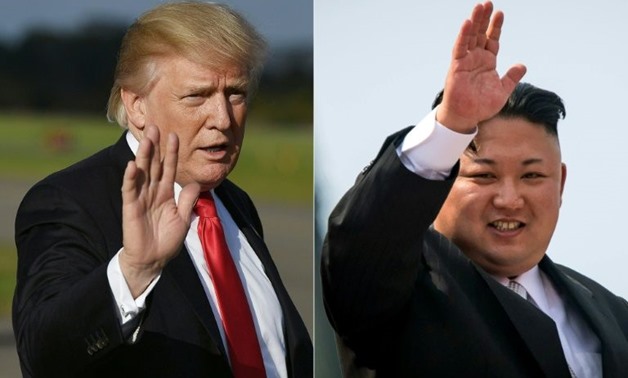
The apparent olive branch comes after a year of mutual threats by US President Donald Trump and North Korean leader Kim Jong-Un -AFP
SEOUL- 13 December 2017: US Secretary of State Rex Tillerson may have opened the way to negotiations with North Korea over its nuclear programme, saying Washington was ready to talk "without preconditions".
The apparent olive branch -- after a year of mutual threats by US President Donald Trump and North Korean leader Kim Jong-Un, and multiple missile tests by Pyongyang, coupled with its most powerful nuclear blast to date -- could help defuse sky-high tensions.
But with the two sides engaged in a war of words there is a long way to go before any negotiations -- let alone a deal.
Here are some questions and answers on the issue.
What has changed?
The US has for years refused to talk unless the North first takes steps towards dismantling its nuclear programme.
But the North has staged six atomic tests and declared itself a full nuclear state after the ICBM test on November 28, rendering the prospect of nuclear disarmament increasingly unrealistic, according to experts.
"We are ready to talk anytime North Korea would like to talk. We are ready to have the first meeting without preconditions. Let's just meet," Tillerson said at a forum in Washington.
William Perry, a former US Defense Secretary who helped broker the 1994 Agreed Framework nuclear deal with the North, said it was "very encouraging news".
"We must find a way to come to the table in order to de-escalate the volatile situation with North Korea," he tweeted.
What does Donald Trump think?
Trump administration officials have piled pressure on Pyongyang with US-led UN sanctions and talk of a potential pre-emptive attack, with National Security Adviser HR McMaster saying this month the potential for war was "increasing every day".
The president has previously dismissed Tillerson's push for talks with the North, tweeting in October that his top diplomat was "wasting his time trying to negotiate with Little Rocket Man" - his favoured epithet for Kim.
"Save your energy, Rex, we'll do what has to be done!" he added -- and rumours have swirled in recent weeks that Trump was about to sack him.
Whether Tillerson's words herald a major policy shift by the administration remains to be seen.
White House spokesman Sarah Huckabee Sanders said Trump's views on the North "have not changed".
How could North Korea react?
The North has long expressed a willingness to talk without preconditions and is likely to respond positively to any such offer, analysts say.
"They have believed that the US would have no choice but to sit down with the North for talks in the end... and they might have been right," said Chung Sung-Yoon, of the Korea Institute for National Unification in Seoul.
"The North's goal is to lay low and endure sanctions until the world will accept the reality that the North has become a nuclear power," he added.
The further its weapons programmes advance, the stronger its position becomes -- and it says it is now able to deliver a nuclear warhead anywhere on the US mainland, although experts believe it still lacks some of the required technology.
What will the North's neighbours say?
China, the North's sole major ally and economic lifeline, and South Korea are likely to welcome Tillerson's comments.
Beijing -- which is under increasing US pressure to tame its wayward neighbour -- has repeatedly pushed for talks, while South Korean President Moon Jae-In is a well-known advocate for dialogue.
Japan -- Washington's key military ally in Asia -- has also called for ways to defuse tensions. Some of the North's rocket tests have overflown the island nation, sparking alarm.
What has happened in previous talks?
Decades of Western attempts to persuade Pyongyang to abandon nuclear weapons have failed.
The Agreed Framework, which offered the North civilian nuclear reactors and other assistance in exchange for denuclearisation, fell apart after the US accused the isolated state of covertly restarting its weapons programme and aid delays angered Pyongyang, which eventually stormed out.
In 2003 the Beijing-led Six Party Talks began, bringing together the US, both Koreas, Russia, Japan and China in a tortuous process. North Korea pledged to give up its nuclear programmes in 2005, but carried out its first atomic blast the following year.
It walked out of the talks three years later, detonating its second device soon afterwards.
It has since continued its weapons drive, accelerating it after Kim inherited power in 2011 from his father Kim Jong-Il.


Comments
Leave a Comment